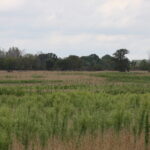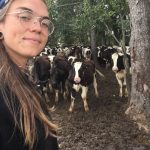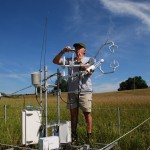East Lansing, MI – Soybean farmers are turning away from conservation agriculture practices that protect soil and environmental health to manage herbicide resistant weeds, say researchers in Michigan State University’s (MSU) Department of Agricultural, Food, and Resource Economics (AFRE). In a new study published in the American Journal of Agricultural Economics, Braeden Van Deynze (now a postdoctoral research associate at the University of Washington), Scott Swinton (MSU), and David Hennessy (MSU), examined the herbicide and tillage records of thousands of soybean farmers across the United
Using prairie strips to understand the value of diversifying agricultural landscapes: Reflections from an LTER Fellow
MSU graduate researcher, Lindsey Kemmerling, is a PhD student in Dr. Nick Haddad's lab at Michigan State University's Kellogg Biological Station. Society today faces three immense ecological challenges: preventing the loss of biodiversity, adapting to climate change, and sustainably supporting a growing population. Humans have caused a global biodiversity crisis, with new studies continuing to reveal stunning rates of biodiversity decline across the entire tree of life. Simultaneously, we are presented with the challenge of sustainably and equitably supporting a growing human
Generosity of local farmer creates national impact
Harold and Edythe Marshall’s gift of their 300-acre farm to Michigan State University has been a major boon to understanding the ecology of new biofuel crops, producing research results with national impact by scientists at MSU's Kellogg Biological Station (KBS). Under a unique partnership between the Marshalls and MSU, the farmland east of Hickory Corners in Barry County is enabling scientists from the KBS Long-term Ecological Research (LTER) program and the Great Lakes Bioenergy Research Center (GLBRC) to conduct unique biofuel research with funding from the US Department of Energy


